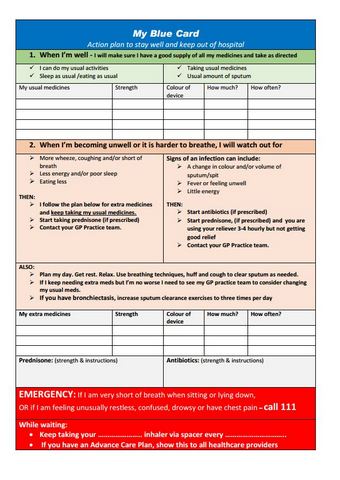Duolin is a combination of two medicines, ipratropium and salbutamol, mixed together in a puffer or inhaler. The combination is used to treat conditions where breathing is a problem, such as COPD, chronic bronchitis and emphysema. They work by relaxing and opening up the air passages, making breathing easier and improving shortness of breath, chest tightness and wheezing.
The combination is used to treat conditions where breathing is a problem, such as COPD, chronic bronchitis and emphysema. They work by relaxing and opening up the air passages, making breathing easier and improving shortness of breath, chest tightness and wheezing.
Duolin belongs to a group of medicines known as bronchodilators or relievers (it is called a reliever medicine because it quickly relieves your breathing problems).
Using an inhaler device enables the medicine to go straight into your airways when you breathe in. This means that your airways and lungs are treated, but very little of the medicine gets into the rest of your body.
In Aotearoa New Zealand, Duolin® is available as an inhaler and nebulising solution. Nebulisers are used when using an inhaler is not suitable. The information on this page is about Duolin inhaler. Read more about nebulisers.
Low or no data? Visit zero.govt.nz, scroll down the page then click on our logo to return to our site and browse for free.
Duolin
Also called ipratropium + salbutamol
Key points about Duolin
- Duolin is used to treat conditions where breathing is a problem, such as COPD.
- Ipratropium + salbutamol sounds like 'ip-ra-TRO-pee-um' and 'sal-BYOO-ta-mol'.
- Find out how to take it safely and possible side effects.

- The usual dose of the Duolin inhaler is 2 puffs 4 times a day. You should not use more than 12 puffs in any 24 hour period.
- Follow your doctor's instructions carefully. The pharmacy label on your medicine will tell you how much to use, how often to use it and any special instructions.
To get the most benefit, it is important to use the correct technique. Ask your doctor, pharmacist or nurse to explain how to use your inhaler. Even if you have been shown before, ask your doctor, pharmacist or nurse to explain again how to use your inhaler if you still have any questions. Here is some guidance.
| How to use your MDI (puffer) | |
 |
Take off the cap and hold the inhaler upright. |
 |
Shake the inhaler to mix the medication. |
 |
Sit upright, tilt your head back slightly (as if you are sniffing) and breathe out gently. |
 |
Hold the device upright, insert the inhaler into your mouth, ensuring that your lips firmly seal the mouthpiece. At the beginning of a slow, deep breath, breathe in through the mouthpiece as you press the inhaler to release one dose or 'puff'. |
 |
Breathe in fully, remove the inhaler from your mouth and hold your breath for 10 seconds or as long as is comfortable. Breathe out gently through your nose. |
Learn more about metered dose inhalers
Using a spacer with your inhaler
A spacer is an attachment to use with your MDI. Using a spacer with your MDI makes it easier to use the inhaler and helps to get the medicine into your lungs, where it’s needed (with less medicine ending up in your mouth and throat). Spacers improve how well your medicine works. Read more about spacers.
- Do you have heart disease?
- Do you have an overactive thyroid (hyperthyroid)?
- Do you have high blood pressure (hypertension)?
- Do you have problems with your prostate, or have you had difficulty passing urine?
- Do you have glaucoma?
- Do you have heart problems such as an unusual heart rhythm?
- Do you have diabetes?
- Do you play competitive or professional sport?
- Are you pregnant or breastfeeding?
If so, it’s important that you tell your doctor or pharmacist before you start using Duolin. Sometimes a medicine isn’t suitable for a person with certain conditions, or it can only be used with extra care.
Like all medicines, Duolin can cause side effects, although not everyone gets them. Often side effects improve as your body adjusts to the new medicine.
| Side effects | What should I do? |
|---|---|
|
|
|
|
|
|
|
|
|
|
| Did you know that you can report a side effect to a medicine to CARM (Centre for Adverse Reactions Monitoring)? Report a side effect to a product(external link) | |
Salbutamol and ipratropium(external link) New Zealand Formulary Patient Information
Regional Blue card COPD Action plan [PDF, 355 KB] District Health Boards, NZ, 2019
5 questions to ask about your medications(external link) Health Quality and Safety Commission, NZ, 2019 English(external link), te reo Māori(external link)
References
- Ipratropium bromide + salbutamol(external link) New Zealand Formulary
Brochures

My Medicines, NZ, 2017

District Health Boards, NZ, 2019

Health Quality and Safety Commission, NZ, 2019
EnglishTe reo Māori
Credits: Sandra Ponen, Pharmacist, Healthify He Puna Waiora. Healthify is brought to you by Health Navigator Charitable Trust.
Reviewed by: Angela Lambie, Pharmacist, Auckland
Last reviewed:
Page last updated:





